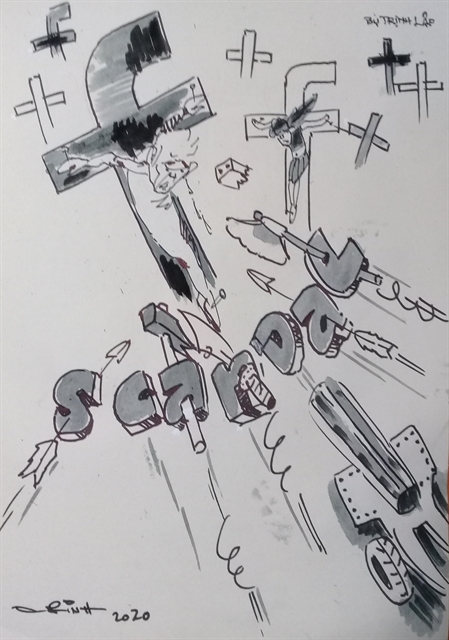 Talk Around Town
Talk Around Town


|
| Illustration by Trịnh Lập |
By An Phương
Along with many unfortunate events that are going on in the world, it is important to discuss “infodemic” or the fake news issue, a type of online crisis that has very much messed up locals’ lives recently.
According to Wikipedia, fake news is a form of news consisting of deliberate disinformation or hoaxes spread via traditional news media or online social media.
I first heard of this term when I was pursuing a degree in communications in Singapore in 2016. At that time, fake news or the use of false information was not as common as it is now.
As I have noticed, acts of spreading fake news are quite popular in Việt Nam, and the famous MC Trấn Thành's experience with fake news led me to choose this topic and share my insights on the matter.
Last month, speculation about Trấn Thành indulging in illegal activities and using drugs appeared on social media, and several Facebook users were found creating and spreading this false information.
This incident gained significant interaction in some Facebook groups and brought Trấn Thành many troubles.
“When I first heard of the news, I was shocked as I’ve been a fan of Trấn Thành for quite some time,” my friend Ngọc Anh, 28, said.
After speaking to some of my friends on the matter, all of them admitted that they actually believed the news when they first heard it.
“That’s the nature of news in general! Not so many people will question what they read, and evaluate and do further research to clarify the information,” said Thu Thảo, 27, adding that even if readers double check, chances are they have already formed a negative impression of individuals mentioned in the rumour, with Trấn Thành being an example.
“With the case of Trấn Thành, I’m glad that he didn’t choose to ignore the news like many artists had done before, but proceeded to discuss the situation with the ones creating and spreading the rumour, with the help of his manager and lawyer,” Ngọc Anh said.
To be honest, I was relatively surprised to see the face-to-face communication which was recorded and uploaded to Trấn Thành’s YouTube channel.
However, considering how his image and thus financial status could be damaged if the rumours were true, I felt the importance of clarifying these deceptive pieces of information publicly.
According to Trấn Thành, about 10 brands have asked him to write to confirm what happened. Many jobs with huge production costs are pending as well because of the incident.
“Unlike other occupations, celebrities should portray a positive image to the mass audience. No brand will want to promote their products via endorsements from celebrities who have a negative image,” Ngọc Anh said.
Thu Thảo agreed and added that although people creating and spreading the rumours have sent their apologies, the financial damage that Trần Thành has to handle, not to mention his time and effort to sort everything out, is still concerning.
“I feel like many social media users, especially the young ones, are not aware that their naïve actions can bring about real chaos to society,” Thu Thảo said, adding that she thinks that social media users do not perceive the impact in the online world to be similar to that in the offline one.
In March, three Vietnamese Internet users were fined US$1,620 for spreading fake news about the coronavirus pandemic on social media.
“It is particularly dangerous for false information to be spread in times of crisis,” Minh Tuấn, 32, a social media expert told me. He saw many posts months ago starting with "My close friend working in the medical field told me that…" or "My friend’s neighbour who travelled places was potentially infected with the virus”, among other attributions that made the narrative more trustworthy.
“I was very angry with how irresponsible many social media users were, as their misleading information put me and my family in great discomfort. My mother, after reading that fake news, strictly requested every member in the household not to go out even though I was flooded with deadlines at that time,” Tuấn said.
Ngọc Anh added that false information led her father to purchase hydrochloroquine in an effort to feel rest assured and even self-medicate if any member of her family became infected with the deadly virus.
I sometimes ask myself why some people decide to spread fake news in the first place and why many are easily deceived by the false or misleading information without having a second thought on the matter.
“The three girls who started and spread the fake news about Trấn Thành said they didn’t mean to bring any harm and they did it just for the sake of interaction,” Ngọc Anh said.
Social media has become quite saturated in recent years and I can’t help but noticing that many online users are competing for virtual attention.
That’s not wrong, I must say.
However, if a piece of information is deliberately fabricated to slander or insult others, lower the honour or dignity of individuals and cause confusion among the public, its creator should be penalised for such an irresponsible act.
“That’s why I felt relieved when our government decided to slap fines in April on people who take advantage of social media to put up false information,” Minh Tuấn said. A fine ranges from US$426 to $850, depending on the situation
The new decree discourages making fake news, but I believe it is equally important for readers to be more mindful of what they see on the Internet.
“The people who receive this information should be responsible for the spread of fake news because, without their attention, the fabricated news wouldn't be able to travel far,” Minh Tuấn said.
With many unfortunate events happening around the globe, one less problem to think about can make it easier for everyone to go about their day. Let’s all be responsible because fake news can bring about real consequences. VNS




